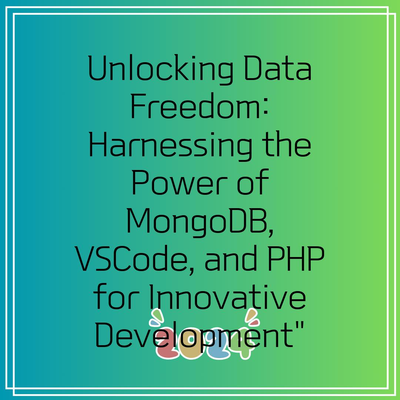
Exploring Data Freedom with MongoDB, VSCode, and PHP
In the modern world of technology, data management has become a focal point for developers and businesses alike. The rise of
The Power of MongoDB for Dynamic Data Management
MongoDB is known for its ability to handle a vast amount of unstructured data. Unlike traditional relational databases, MongoDB stores data in a JSON-like format called BSON, which allows for greater flexibility. This means developers aren’t bound by rigid schemas and can easily adapt to changes in data requirements. The database’s built-in scalability and performance efficiency make it a prime choice for
One of the major benefits of MongoDB is its aggregation framework, which allows for advanced data analysis and transformation. Developers can perform complex operations, such as filtering, grouping, and projecting data using a variety of methods without straining the performance. This flexibility proves invaluable when dealing with large datasets or when diving into
Visual Studio Code: A Developer’s Haven
Visual Studio Code has become a fundamental tool for developers around the globe. Its user-friendly interface, coupled with an extensive library of plugins, allows for a tailored development experience. Integrating MongoDB with VSCode not only simplifies coding tasks but also streamlines the debugging process.
The introduction of extensions enables real-time collaboration and enhances productivity. Developers can connect to their MongoDB databases directly from VSCode, making it easier to create, read, update, and delete operations (CRUD) without having to switch between different environments. This allows for seamless data manipulation and testing, ensuring that developers can focus on building effective solutions rather than getting bogged down by the intricacies of their tools.
PHP: A Backbone for Dynamic Web Applications
PHP has established itself as a backbone for web development, powering platforms like WordPress, Drupal, and many custom applications. Its compatibility with MongoDB through various libraries, such as
Using PHP in conjunction with MongoDB provides a streamlined way to manage data on the server side. With MongoDB’s dynamic schema capabilities, developers can effortlessly incorporate new features and data structures into their applications. This adaptability fosters innovation, enabling teams to iterate faster and more efficiently.
Furthermore, PHP’s performance optimization ensures that web applications run smoothly, even when handling significant amounts of data. When combined with MongoDB’s capabilities for real-time data retrieval and processing, the result is an incredibly agile development environment.
Creating a Data-Driven Application: A Case Study
Consider a scenario where a company wants to develop a customer feedback application. Using MongoDB to store user submissions, the application can rapidly adjust to changing data structures, such as adding new fields for additional feedback types or categories.
With VSCode, developers can easily manage their codebase, implement features, and perform testing. The integrated terminal allows for commands to be executed conveniently, while the debugging tools enable developers to identify and rectify issues promptly.
As the application scales, PHP can handle various user requests efficiently, ensuring that responses are quick and seamless. The incorporation of MongoDB’s aggregation framework can provide valuable insights into user feedback trends, allowing the company to make data-driven decisions swiftly.
The Future of Data Exploration
As industries increasingly rely on data for decision-making, the importance of having a robust system for data exploration cannot be overstated. MongoDB, VSCode, and PHP create a powerful synergy that allows developers to innovate without the constraints of traditional data models.
With ongoing advancements in these technologies, the future looks promising for developers keen on embracing
Conclusion
In conclusion, the convergence of MongoDB, Visual Studio Code, and PHP offers an unparalleled opportunity for developers to explore data freely and effectively. By embracing these technologies, developers not only enhance their productivity but also cultivate an environment conducive to rapid innovation. As businesses look for ways to leverage data for strategic advantage, mastering these tools will undoubtedly pave the way for success in the ever-evolving landscape of technology.


